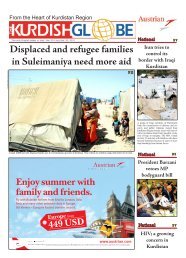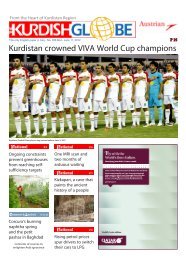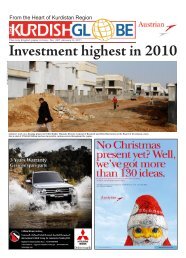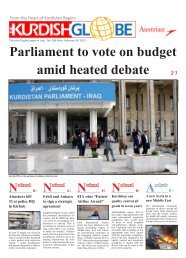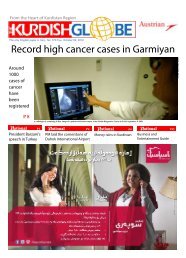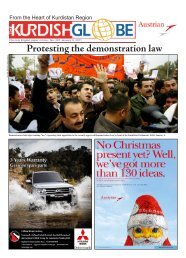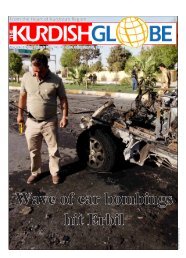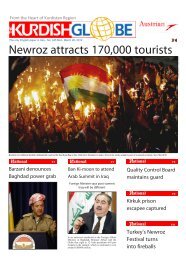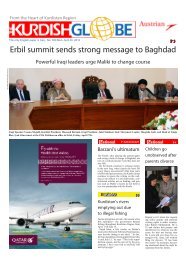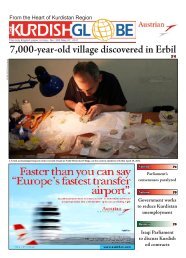Kurdish-Turkish ties stronger than ever - Kurdish Globe
Kurdish-Turkish ties stronger than ever - Kurdish Globe
Kurdish-Turkish ties stronger than ever - Kurdish Globe
Create successful ePaper yourself
Turn your PDF publications into a flip-book with our unique Google optimized e-Paper software.
The <strong>Kurdish</strong> <strong>Globe</strong> No. 349, Monday, April 23, 2012 2Gap widens between Erbil and Baghdad amidst lack of <strong>Kurdish</strong> unity<strong>Globe</strong> EditorialPrior to Kurdistan Region Presidudent Massoud Barzani’s visit tothe U.S. and a number of Europeauan and <strong>Turkish</strong> capitals, relationsbetween Erbil and Baghdad werestretched to a breaking point. Barzuzani, during his speeches at Newuwroz and other occasions, openlyaccused Iraq Prime Minister NouriAl-Maliki of being a dictator andcomplained of lack of intentionby Iraqi political actors to resolvepending issues between Erbiland Baghdad according to Iraq’spermanent constitution. Barzaniwarned that unless an urgent solulution was found, he would returnto his people to decide which pathto follow. Such a warning wasrightly interpreted by many as acall for independence.It is now well known that thevital issues between Erbil andBaghdad resonate around dispuputed areas including oil-richKirkuk, the hydrocarbon law,power-sharing, and the status ofPeshmerga forces. Maliki’s reactutions to Barzani’s remarks and theIraqi Oil Ministry’s stance againstthe global oil giant, Texas-basedExxonMobil, on the issue of oilexploration contracts with theKRG indicate that relations betutween the two capitals may havealready passed return.In an interview with a <strong>Kurdish</strong>newspaper, Awena (Mirror) IraqiPM Maliki implicitly accused the<strong>Kurdish</strong> leaders of smuggling oiloutside the country and puttingtheir personal interests before the<strong>Kurdish</strong> people. He denied thecharges that he established a dictutatorial rule in Baghdad, sayingthat Kurds occupy high-rankingposts in various government estutablishments including the army.Maliki’s implicit accusationsagainst Barzani and his aides asgang and mafia are indicative ofthe huge pressure that Barzanihad on Maliki as his premiershipmostly deepens on his alignmentwith the <strong>Kurdish</strong> Bloc in IraqiParliament.While Maliki took a battle positution, the Iraqi Ministry of Oil tooka sharp stance against ExxonMobubil last Thursday. The Iraqi OilMinistry stated that ExxonMobilCorp. is not allowed to bid in theIraqi Prime Minister Nuri al-Maliki talks to an unidentified official duringthe opening session of the first Arab summit to be held in Iraq in 22 yearson March 29, 2012.May energy auction due to itsdeals with the KRG. ExxonMobilsigned contracts with the Ministutry of Natural Resources of theKRG last October to search foroil in six blocks, bypassing thecentral government in Baghdad.The deputy head of the Oil Miniuistry's Licensing and PetroleumContracts Department, Sabah al-Saidi, told The Associated Pressthat the reason for the move wasExxon's refusal to relinquish itsdisputed deals with the Kurds:"Exxon has been removed fromthe list of qualified companiesbecause it refused to abandon thedeals with the <strong>Kurdish</strong> region asrequested by the Ministry of Oil."Baghdad insists that all the oildeals with KRG must be ratifiedby Baghdad first. The Kurds, onthe other hand, maintain that theIraqi Constitution grants the KRGto strike agreements with internatutional oil companies to explore oilin Kurdistan Region.Officials from Baghdad’s OilMinistry recently claimed thatExxon had sent two letters assuriuing that it would freeze the Kurdiuish deals until the central governmument and the Kurds resolve theirdifferences. But <strong>Kurdish</strong> authoritu<strong>ties</strong> have maintained that the contutracts are still valid and Exxon iscommitted to them.Baghdad’s decision to excludeExxon from participating in theenergy auctions this coming Maysuggest clearly that Exxon is commumitted to its deal with the KRG.While political tensions betutween the two capitals on theissue of disputed territories, oilexploration rights and others maybe considered internal affairs ofIraq, the growing strains betweenKurdistan Region and Iraq haveregional and international dimensusions as well. Rising political turmumoil in the Middle East, globalpower and hegemony strugglesover the region are forcing newalignments and positions amongstthe regional powers and forces.This can explicitly be seen in thecase of Syria. Due to the natureof <strong>Kurdish</strong> national question’s regugional and international character,the Kurds find themselves in theseregional and global conflicts.While KRG and Kurdistan’spresident have taken a clear positution regarding Syrian Kurds andagainst Basher al-Assad’s regimein Syria, Maliki--under the influeuence of Iran--supports the regimein Syria. The critical role that theSyrian Kurds can play againstthe regime and equally the criticucal role that the KRG has overthe Syrian Kurdistan Iran throughMaliki attempts to pressure KRGand distract its attention from Syriuian Kurdistan. Without doubt, behuhind Maliki’s bold stance againstKRG one can assume is Iran’sunambiguous support.Given the poor democratic histutorical background of Iraq sinceits inception and the rising regugional crisis, the relation betweenErbil and Baghdad is unlikely toAFP PHOTO/AHMAD AL-RUBAYEimprove. The cultural developmuments in Kurdistan, particularlyamong the young generation, areindicative of even bigger gaps betutween the Kurds and Arabs <strong>than</strong>the political gaps between the polulitical leaders. Unless ruled by aSaddam-like dictatorial regime,Iraq does not have any chance tosustain either its territorial integrurity or national unity. It is almostinevitable that Iraq has to be disiuintegrated into two if not threeseparate political enti<strong>ties</strong>.Massoud Barzani was absolulutely right to warn that a dictatorfrom Baghdad cannot rule Kurdiuistan, and if Baghdad attempts todo so the Kurds would go theirseparate way. The process has alruready begun and it is only matterof time and regional developmentto decide when and how it happupens. It has already begun amongthe people. The Kurds and Arabsare now two culturally and polulitically separate groups and mostimportantly they do not share acommon future and vision.The <strong>Kurdish</strong> political leadersand political enti<strong>ties</strong> should ratherprepare themselves for such ineuevitability. A separation from Iraqand establishment of an independudent Kurdistan needs courageousleadership and national unity inorder to face the challenges thatwill arise.A close reading of <strong>Kurdish</strong> polulitical discourse indicates, howeu<strong>ever</strong>, a rather grim picture onthe issue of national unity anda common vision. Despite theirstrategic agreement, the Kurdiuistan Democratic Party and thePatriotic Union of Kurdistan, thetwo powerful political groups insouthern Kurdistan, display contutradictory pictures in regard tothe discussion around the indepupendence of Kurdistan. MassoudBarzani, both the president ofKurdistan as well as president ofKDP, pushes forward for an indepupendent Kurdistan; Jalal Talabanuni, the Iraqi president and head ofPUK, portrays rather a pessimisticview regarding the independenceissue. This can be explicitly seenin a recent interview of PresidentJalal Talabani.During an interview with theQatar-based Al-Jazeera satellulite, Talabani said the independudence of Kurdistan in the nearfuture is ‘impossible.’ “Not onlyis independence not possible,but also now it is in the interestof the <strong>Kurdish</strong> people to remainwithin the framework of Iraq.” Inresponse to the question, ”Kurdiuistan is more powerful and moreprosperous now it seems <strong>than</strong> atany time in its history. What is thenext step?” Talabani stated: “It’strue that we [in Kurdistan] havethe right of self-determination,but we use these rights to servethe Iraqi democratic system.”More interestingly when thejournalist asked “what happensthen, for all those young peoplein particular, who want an indepupendent Kurdistan – who don’tsee a future in Iraq? When youlook around Kurdistan – partuticularly with the new generation– they don’t learn Arabic, theydon’t seem to feel much connectution with the rest of Iraq. Whatis there still that <strong>ties</strong> the <strong>Kurdish</strong>region to Iraq?” President Talulabani answered: “You know thisera, this century, is not the era ofsmall countries; it is [an era] ofbig unions. Look to Europe, theyare trying to reunite. So it is withiuin the framework of a democraticfederal Iraq that we are engagingin all activi<strong>ties</strong>, and we have allkinds of freedom and we have allpossibili<strong>ties</strong>, but we must be reaualistic. A politician who wants toserve his people must lead peoplein a way that serves their intereuests.”Talabani’s remarks are highlysubjective and require far moreprofound analysis <strong>than</strong> this editorurial as we see the global trend thatwitnesses the establishment ofnew independent states, and regugarding the issue of ‘small’ countutry survival, a call for measuringBosnia with Kurdistan in terms ofpopulation and territorial size isrequired.Despite the fact that such remumarks by Talabani are not newand indicate a general outlook ofTalabani, nonetheless the contextof the interview at such a sensitutive time and the Kurdistan presidudent’s remarks regarding <strong>Kurdish</strong>independence can be interpretedas a lack of political nationalunity and vision. At such criticalperiod the Kurds must develop acoherent strategic national policyin order to face the crushing forceues that challenge the Kurds.Azad AminWeekly paper printed in ErbilFirst published in 2005www.kurdishglobe.netinfo.kurdishglobe@gmail.comAddress:Erbil, Bakhtiyari QuarterEXECUTIVE EDITORJawad QadirEDITORAzad Aminazad.kurdishglobe@gmail.comSenior U.S. EditorSuzanne DeRouensuzi.kurdishglobe@yahoo.comSenior U.K. EditorBashdar Pusho Ismaeelbashdar@hotmail.comAko Muhammed+964 750 4661936ako.kurdishglobe@gmail.comAiyob Mawloodi+964 750 4776905aiyob.kurdishglobe@gmail.comQassim Khidhir+964 750 4823081qassim.kurdishglobe@gmail.comSTAFF WRITERSSazan M. Mandalawisazan.kurdishglobe@gmail.comZakaria Muhammed+964 750 475 3897zakaria.kurdishglobe@gmail.comRawaz Koyee+964 750 1163296rawaz26.kurdishglobe@gmail.comARTS EDITORDiyaco Qayoumy +964 750 4036252diyaco.kurdishglobe@gmail.comAdvertisementFor information and prices of ad spots, please contact<strong>Globe</strong>’s Advertisement section: Rizgar Yahyarizgar.kurdishglobe@gmail.comCell: +964 750 4055888You can also check prices and packages by loggingon to: kurdishglobe.net/adSubscriptionThe <strong>Kurdish</strong> <strong>Globe</strong> can be delivered to your office orhome address, whether in Kurdistan or abroad.To subscribe: Please contact the <strong>Globe</strong> DistributionSection: Rauf Aspindarairauf.kurdishglobe@gmail.com+964 750 4497976You can also subscribe by logging onto:kurdishglobe.net/subscription



